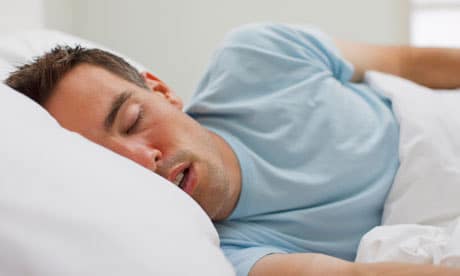 We spend about one-third of our lives asleep, yet sleep is one of the least understood areas in medicine. Countless medical studies conducted across the world have tried to crack the mystery of sleep, but only one conclusion persists: people need at least six to seven hours of restful sleep every night. Unfortunately, more than a third of Americans report they are not receiving enough sleep, putting them at risk for obesity, diabetes, high blood pressure, heart disease, stroke and other physical and mental health problems.
We spend about one-third of our lives asleep, yet sleep is one of the least understood areas in medicine. Countless medical studies conducted across the world have tried to crack the mystery of sleep, but only one conclusion persists: people need at least six to seven hours of restful sleep every night. Unfortunately, more than a third of Americans report they are not receiving enough sleep, putting them at risk for obesity, diabetes, high blood pressure, heart disease, stroke and other physical and mental health problems.
Millions of Americans are sleep deprived, the result of busy schedules or untreated medical conditions that occur during sleep. Increasingly, more are distracted by televisions, computers and smart phones; this inability to “unplug” at bedtime is a leading cause of sleep deprivation and helps explain why only 65% of respondents in a recent study get the recommended seven hours of sleep each night.
Sleep studies help in the diagnosis and treatment of sleep disorders. A sleep study involves overnight monitoring of every aspect of a patient’s health while he or she sleeps. These studies are often done in a special facility, but recently at-home testing has gained popularity thanks to advances in monitoring technology. The results provide complex data, score sleep quality and give the doctor or sleep specialist a roadmap showing how to best improve the quality of sleep.
Sleep studies can help diagnose sleep-related breathing disorders such as sleep apnea. They can also diagnose sleep-related seizure and movement disorders. Serious conditions like these cause problems that deeply impact patient health and, in some cases, prove fatal. Patients are normally oblivious to their breathing and movements and are unaware of their quality of sleep. However, good sleep is an essential component to reducing high blood pressure and the likelihood of serious health complications such as heart disease, stroke and diabetes.
Sleep apnea is most often treated with Continuous Positive Airway Pressure (CPAP), involving a breathing mask attached to a machine that delivers steady bursts of air pressure while you sleep. This keeps your airway open and prevents interruptions in breathing. Sleep-related seizures are usually treated with medication. Regardless of the condition, the most important phase of this process is diagnosis. A sleep study is crucial to overall patient health.
National Sleep Awareness Week is March 6th – 12th. This is the perfect opportunity to assess the quality of your sleep and determine whether a sleep study might be beneficial. If you feel tired during the day, wake up frequently during the night and have trouble falling or staying asleep you should speak with your doctor about the possible benefits of a sleep study.
